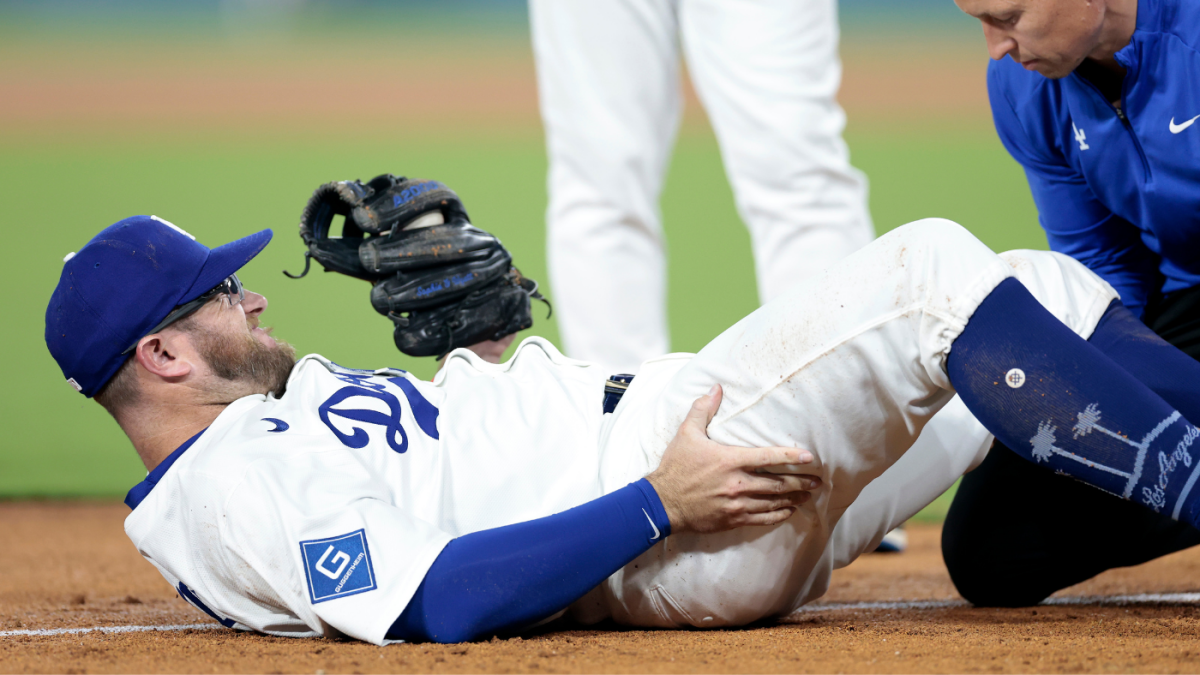In the unpredictable world of baseball, where moments of brilliance can be overshadowed by sudden setbacks, the Los Angeles Dodgers found themselves grappling with a harsh reality. During a game against the Chicago White Sox, third baseman Max Muncy suffered a knee injury that sent shockwaves through the organization and its fanbase. The incident, which occurred in the sixth inning as Muncy attempted to tag out baserunner Michael A. Taylor, resulted in immediate pain and required assistance for Muncy to leave the field. The visual assessment of the injury was grim, with reports describing it as “serious-looking” and “devastating.” This event underscores the fragility of professional sports and the profound impact that injuries can have on a team’s trajectory.
The Dodgers’ manager, Dave Roberts, provided an initial assessment following the game, noting that Muncy was experiencing “left knee pain” and would undergo an MRI to determine the extent of the damage. While Roberts expressed cautious optimism based on preliminary exams, the MRI results would ultimately dictate the severity of the injury and the timeline for Muncy’s recovery. The team’s careful language reflected both hope and the inherent uncertainty that accompanies such situations. The Dodgers, known for their depth and resilience, would now face the challenge of navigating a season without one of their most valuable players.
Max Muncy’s significance to the Dodgers extends far beyond his statistics. As a cornerstone of the team’s offensive lineup, Muncy had overcome a slow start to the season to become one of the Dodgers’ most consistent hitters. His ability to get on base, drive in runs, and provide power made him an indispensable part of the team’s championship aspirations. Beyond his offensive contributions, Muncy is known for his high baseball IQ, leadership qualities, and clutch performances. His absence would leave a void not only in the lineup but also in the locker room, where his presence has been a key element of the team’s dynamic. The Dodgers would now have to rely on players like Kiké Hernández and Chris Taylor to step up and fill the gap, a task that would test the team’s depth and adaptability.
The injury also raises broader questions about player health and safety in professional baseball. The sport’s demanding physical nature, with its repetitive motions, high-impact collisions, and grueling schedule, makes players susceptible to a wide range of injuries. From knee and shoulder problems to hamstring strains and elbow issues, injuries are an unfortunate reality of the game. Teams invest heavily in injury prevention and rehabilitation, employing advanced training techniques, state-of-the-art medical facilities, and dedicated medical staffs. However, despite these efforts, injuries remain a constant threat, underscoring the inherent risks of playing professional baseball. The Dodgers’ ability to adapt and find new combinations will be critical to maintaining their competitive edge as they navigate this period.
Beyond the physical implications, injuries also take a toll on the mental aspect of the game. Players must cope with the disappointment of being sidelined, the uncertainty of the recovery process, and the pressure to return to form. The Dodgers’ support system, including trainers, doctors, and mental skills coaches, will be essential in helping Muncy and other injured players navigate these challenges. The team’s overall resilience will also be tested as they maintain their focus and determination despite the adversity they face. Strong leadership from veteran players and a positive team culture can help mitigate the negative effects of injuries and keep the team on track.
As the Dodgers await the results of Muncy’s MRI, speculation abounds regarding the severity of the injury and its potential impact on his season. A minor sprain could sideline him for a few weeks, while a more serious ligament tear could require surgery and a prolonged absence. The team’s medical staff will carefully evaluate the MRI images and consult with specialists to determine the best course of treatment. Regardless of the diagnosis, Muncy’s recovery will require patience, dedication, and a strong support system. He will work closely with trainers and physical therapists to regain his strength, mobility, and confidence. The Dodgers will provide him with the resources and encouragement he needs to make a full recovery.
The remainder of the season promises to be a compelling drama, filled with twists and turns, as the Dodgers navigate the challenges of injuries, competition, and the relentless pursuit of excellence. The team’s ability to adapt, persevere, and stay focused on their ultimate goal will determine their fate. While Muncy’s absence will undoubtedly be felt, the Dodgers have the talent and depth to overcome this setback and continue their quest for success. The road ahead will be challenging, but with determination and resilience, the Dodgers can overcome this adversity and continue their pursuit of a championship. The time for talk is over; it is time for action.

